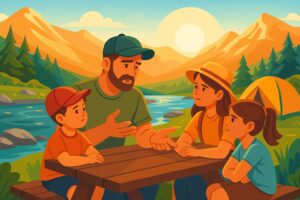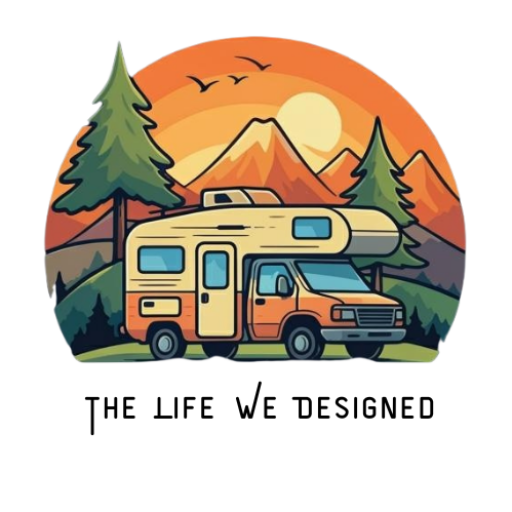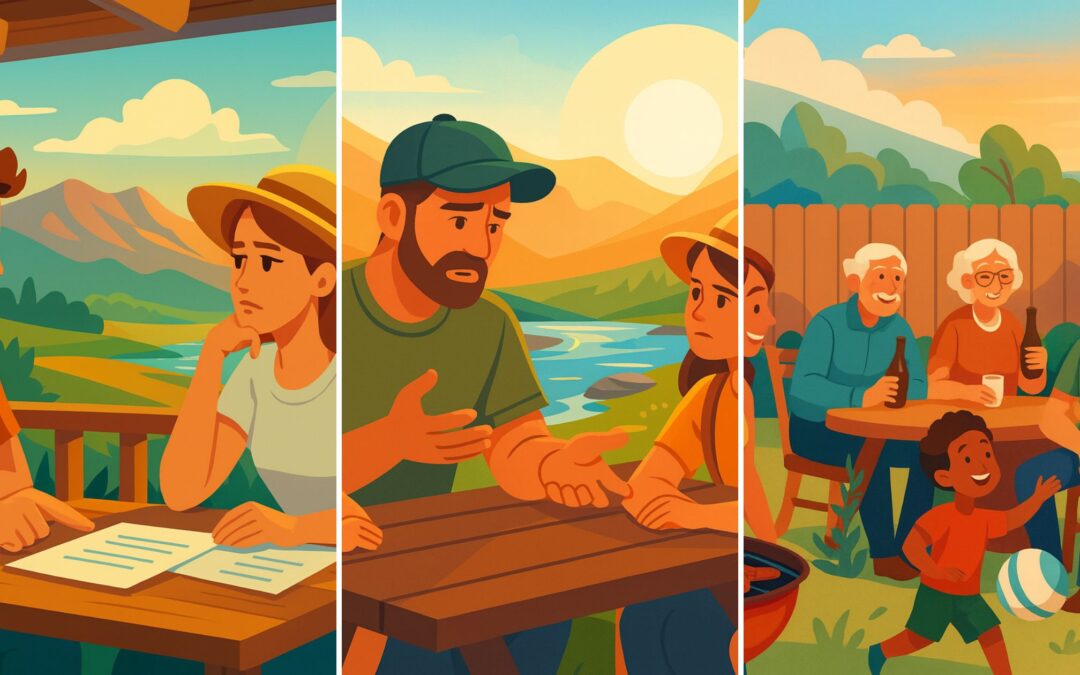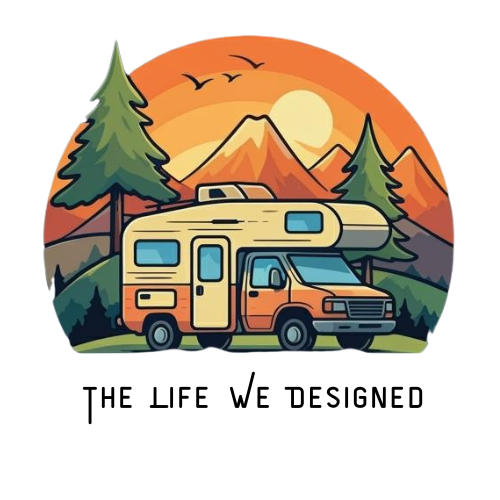The hardest part of RV life isn’t learning to drive a 40-foot motorhome or figuring out how to dump your black tank.
It’s the conversation where you tell your family you want to sell the house and hit the road.
Hundreds of people’s RV dreams die, not because of mechanical failures or budget shortfalls, but because families couldn’t navigate the conversations required to make this lifestyle change work.
The cost of avoiding these difficult conversations is enormous: resentment, failed transitions, damaged relationships, and dreams that never become reality.
But here’s what I’ve learned through this transition: most resistance isn’t really about RV life itself. It’s about fear, uncertainty, and feeling unheard.
When you approach these conversations with the right scripts and genuine curiosity about others’ concerns, everything changes.
Today, I’m sharing word-for-word scripts for the three most critical conversations you’ll need to have: with your partner, your children, and your extended family.
These aren’t theoretical frameworks – they’re tested conversations that have helped families move from “absolutely not” to “let’s do this.” You’ll also see an example of how one family used these principles to transform complete resistance into enthusiastic support.
Script #1: The Partner Conversation

Getting Your Spouse on Board Without Starting World War III
Your partner conversation sets the tone for everything that follows. Get this wrong, and you’ll be fighting an uphill battle. Get it right, and you have an ally in navigating every other relationship challenge.
Note: You may want to go through our RV Life Decision Kit before starting any of these conversations.
The Opening Script:
“I’ve been researching something seriously, and I’d love to share what I’ve learned and get your honest thoughts. This isn’t about convincing you of anything – it’s about us exploring this possibility together and making sure we’re both fully on board before making any decisions.”
Notice what this opening does: it positions you as partners exploring an option, not as someone who’s already decided to drag along a reluctant spouse.
Key Questions to Ask:
After sharing your research (not just your dreams), ask these four questions and really listen to the answers:
- “What part of this excites you most?”
- “What concerns you most about this idea?”
- “What would need to be true for you to feel excited about this?”
- “How do you see your daily life changing in positive ways?”
These questions do something magical: they move the conversation from defending your position to understanding your partner’s perspective.
Handling the Top 3 Objections:
“This sounds like your dream, not mine”
Response: “You’re absolutely right that I shouldn’t pursue MY dream at the expense of OUR happiness. Help me understand what YOUR ideal life would look like. Maybe there’s a way to combine our visions, or maybe I need to reconsider this completely.”
This response does two things: it validates their concern and makes them a partner in problem-solving rather than an obstacle to overcome.
“What about financial security?”
Response: “I’ve done some real number-crunching, and I’d love to show you what I found. [Share your Week 2 financial analysis from the RV Life Decision Kit].
What questions does this raise for you? What additional financial security would you need to feel comfortable?”
Never dismiss money concerns as “fear-based.” Money represents security, and security is a legitimate need. Show them you’ve done the work, then ask what else they need to feel safe.
“I don’t want to live in a tiny space.”
Response: “Space is a legitimate concern.
- Would you be willing to visit some RVs with me so we can both get a realistic sense of what different sizes feel like?
- Or are there other housing alternatives that might give us more freedom without the space constraints?”
This response acknowledges their concern while opening the door to exploration and compromise.
The Follow-Up Strategy:
End every partner conversation with: “I don’t want us to sacrifice our important relationships either.
- How could we maintain the connections that matter most to us?
- What if we planned our travels around visiting people we care about?”
This shows you’re thinking about their whole life, not just your RV adventure.
Script #2: The Kids Conversation

Age-Appropriate Scripts That Build Excitement Instead of Fear
Children’s reactions often surprise parents.
Sometimes the kids you expect to resist become your biggest advocates, while others struggle more than anticipated.
The key is using age-appropriate language and genuinely including them in the decision-making process.
Elementary Age (5-11):
“You know how we love adventures and seeing new places?
Dad/Mom and I are thinking about a really big adventure where we could travel around the country and see amazing places together.
It would mean living in a special house on wheels – kind of like camping, but with our own bedroom and kitchen that travels with us.”
Key questions for younger kids:
- “What sounds exciting about that to you?”
- “What would you be worried about?”
- “What would you want to make sure we could still do?”
Middle School (12-14):
“We’re considering a major family change that would affect all of us, and your input is really important to us.
We’re considering selling the house and traveling around the country in an RV for at least a year.
This would mean changes to school, friends, activities – basically everything. We want to hear your honest thoughts.”
Middle schoolers need to feel like stakeholders, not just recipients of adult decisions.
High School (15-18):
“We’re considering a major family decision, and since you’re 15, we want you to be a full participant in this discussion, not just someone we tell what we’ve decided.
We’re thinking about moving into an RV and traveling full-time to National Parks around the country.
This would significantly impact your high school experience, so we need your honest perspective.”
Teenagers need a real voice and real choice. Sometimes that means accepting their decision to stay and finish high school locally.
Universal Kid Concerns and Responses:
“What about my friends?”
“We would make sure you could still talk to your friends all the time, and we’d plan trips back to visit them. Plus, you’d probably make friends in all the new places we visit!”
“What about school?”
“We’d figure out school together – there are ways to do school while traveling that might be even more fun than regular school!”
“I want to stay and finish with my class!” (High schoolers)
“That’s a completely valid choice. If you decided you wanted to stay and finish here, what would that look like? Could you live with Aunt Judy or your friend Spencer? How would we make that work?”
Never dismiss a teenager’s desire to maintain their social connections and milestone experiences.
Sometimes the best compromise is waiting or adjusting your timeline.
Script #3: Extended Family and Critics

Dealing with the ‘You’ve Lost Your Minds’ Crowd
Extended family conversations require a different approach. You’re not seeking their permission, but you do want to preserve relationships and minimize ongoing conflict.
The Announcement:
“We wanted to share something we’re seriously considering and get your thoughts. We’ve been researching the possibility of [specific RV life plan].
We know this might sound sudden or concerning, so we want to explain our thinking and hear your perspective.”
Key Points to Cover:
- Why this appeals to you (share your vision, not just complaints about current life)
- That you’ve done serious financial and practical research
- How you plan to maintain family relationships
- What safeguards and backup plans you have in place
Top Objections and Responses:
“What about the grandchildren’s education?”
“We’ve researched education options thoroughly. [Share specific plan]. The kids would actually get incredible real-world learning experiences while maintaining academic progress.”
“This sounds irresponsible/risky!”
“I understand why it might seem that way. Can I share the research I’ve done about the financial and practical aspects? I think you might be surprised by how thoroughly we can plan for this.”
“What if something goes wrong?”
“We’ve thought about that too. [Share backup plans]. We’re not burning bridges – we’re creating more options for our lives.”
Remember: you don’t need everyone’s approval, but you do want to maintain relationships that matter to you.
Success Story: The Martinez Family Breakthrough
How One Family Went from ‘Absolutely Not’ to ‘Let’s Do This’
When Carlos Martinez first mentioned RV life to his wife Maria, her response was immediate: “Absolutely not. I’m not living in a tin can with three kids.”
Their 16-year-old daughter Emma was equally horrified. “You want to ruin my social life and make me a weirdo homeschool kid,” she said.
Carlos’s parents were convinced their son had lost his mind. “You have a good job and a beautiful home,” his mother said. “Why would you throw that away?”
The breakthrough came when Carlos stopped trying to convince and started asking questions.
“Instead of presenting RV life as our decision, we presented it as our question,” Carlos explains. “I asked Maria what she’d need to feel excited about more freedom and adventure. Turns out, she was terrified about losing financial security and her social connections.”
They compromised: keeping their house and renting it out for the first year, planning routes around visiting friends and family, and choosing a larger RV with separate spaces for the kids.
“Once Maria felt heard instead of steamrolled, she became my partner in planning,” Carlos says. “And when Emma realized she could still maintain her friendships and maybe even visit colleges across the country, she got excited too.”
The key insight? They moved from “We’ve decided” to “Help us decide” – and that made all the difference. Today, the Martinez family is six months into full-time RV life and loving every minute.
“Our biggest opponents became our biggest supporters once they felt included instead of informed,” Maria adds. “Even Carlos’s parents admitted they were wrong when they saw how happy and healthy our family became.”
When Conversations Go Wrong: Recovery Strategies
What to Do When Someone Says ‘Absolutely Not’
Not every conversation will go smoothly. Here’s how to recover when things get heated or someone shuts down completely:
Give People Time to Process: Don’t push for immediate agreement. Initial resistance often softens with time and information. Schedule follow-up conversations rather than trying to resolve everything in one sitting.
Focus on Understanding: Ask “Help me understand what concerns you most” instead of defending your position. Often, resistance is about deeper fears that haven’t been articulated.
Look for Compromise Solutions: Maybe it’s timing (waiting a year), location (staying closer to family), duration (trying it for six months first), or scope (part-time instead of full-time).
Respect Firm Boundaries: Some resistance is initial shock that will fade. Some is fundamental incompatibility with your plans. Learn to tell the difference and honor real boundaries.
Preserve Relationships Above All: No RV adventure is worth destroying your marriage or family relationships. Sometimes the answer is modifying your plans, not convincing everyone to accept them.
Remember: The goal isn’t to win every conversation – it’s to build genuine alignment with the people who matter most to you.
Your Next Conversation
The most successful RV families aren’t the ones who had easy conversations – they’re the ones who had honest ones. They asked real questions, listened to real concerns, and found real solutions that worked for everyone involved.
Your RV dreams don’t have to be a solo journey. With the right conversations, they can become a family adventure that brings you closer together instead of pulling you apart.
Your next step:
- Download and complete the RV Life Decision Kit. You will need the data to show your family.
- Choose which conversation you need to have first, and schedule it for this week. Use these scripts as starting points, but make them your own. The life you’re dreaming about starts with the conversation you’re avoiding.
- Follow and Share your success on our Instagram page
- Enjoy the process of building your new future!



